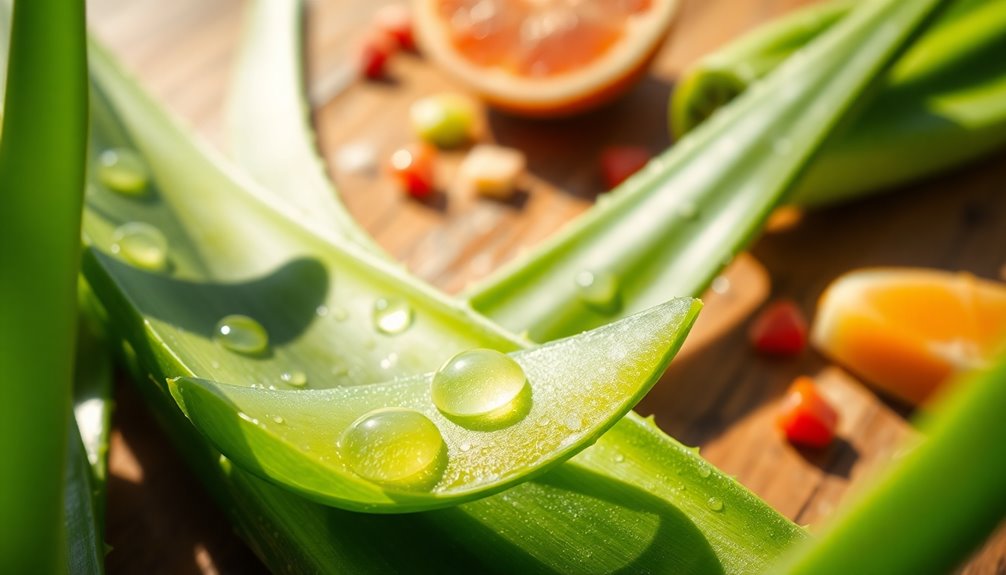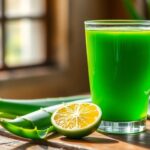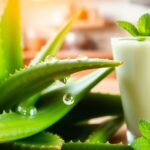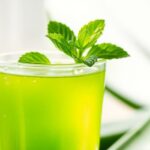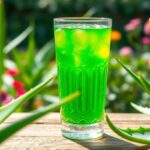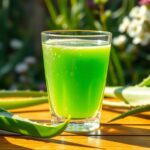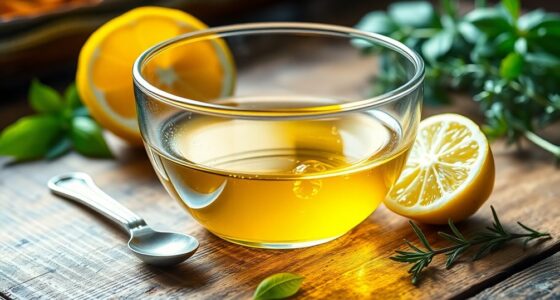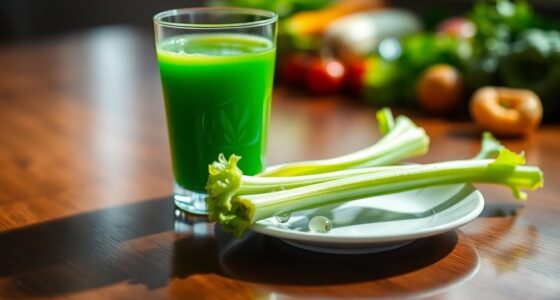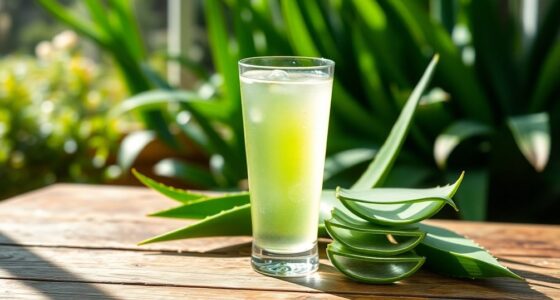Eating raw aloe vera can revolutionize your health! It's packed with over 75 active ingredients, offering essential nutrients like calcium and potassium. You'll enjoy benefits like improved digestion, enhanced skin hydration, and powerful antioxidants that fight chronic diseases. Plus, it helps with inflammation and supports gut health. Just remember to consume it in moderation to avoid potential side effects. If you want to explore how to incorporate this superfood into your daily routine, there's much more to discover!
Key Takeaways
- Aloe vera is rich in antioxidants and nutrients, supporting overall health and reducing the risk of chronic diseases like heart disease and cancer.
- It acts as a natural laxative, promoting digestive health and potentially relieving gastrointestinal issues like GERD and IBS.
- Regular use of aloe vera enhances skin hydration, reduces acne, and boosts collagen production for improved skin elasticity and texture.
- Consuming aloe vera in moderation can provide health benefits while minimizing risks of gastrointestinal distress and electrolyte imbalances.
- Consulting a healthcare professional is essential before incorporating raw aloe vera into your diet, especially for those with existing health conditions.
The Nutritional Powerhouse of Aloe Vera
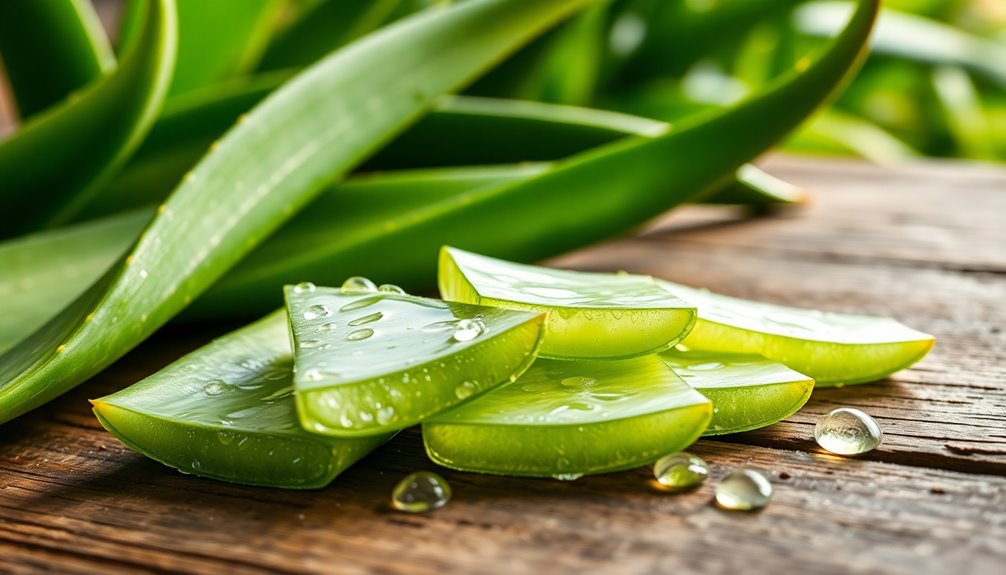
Aloe vera is truly a nutritional powerhouse packed with over 75 active ingredients that support your overall health.
This incredible plant contains essential vitamins and minerals, including 74 mg of calcium and 110 mg of potassium in just an 8-ounce serving of pure aloe vera juice, all while being low in calories.
Its rich antioxidant properties help combat chronic diseases, while beta carotene promotes eye health.
When you consume aloe vera, you benefit from its polysaccharides, which enhance hydration and boost skin health.
Additionally, its prebiotic effects support gut health and aid digestion, making aloe vera an excellent addition to your diet.
Moreover, aloe vera's anti-inflammatory effects can also improve skin conditions, making it a versatile choice for overall wellness.
Embrace this versatile powerhouse and enjoy its numerous benefits for a healthier you!
Digestive Health Benefits of Aloe Vera
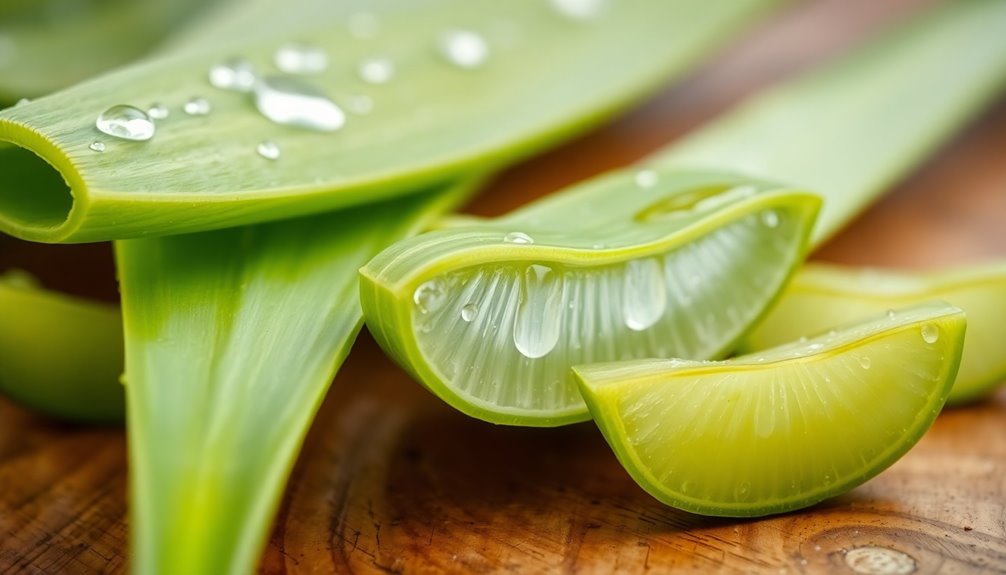
When it comes to supporting digestive health, incorporating aloe vera into your diet can be incredibly beneficial. Aloe vera is known for its soothing properties, which can help alleviate digestive discomfort and promote a healthy gut environment. Additionally, when combined with other nutritious ingredients, such as honey, it can enhance digestive wellness further. In fact, many people explore honey benefits for weight loss, as it can serve as a natural sweetener that may aid in metabolism while providing essential nutrients.
Here are some key digestive benefits of aloe vera:
- Natural Laxative: Aloe vera juice contains anthraquinone glycosides that can help relieve constipation by softening stool consistency.
- Gastrointestinal Relief: Preliminary research shows potential benefits for gastrointestinal issues like GERD and irritable bowel syndrome (IBS).
- Nutrient Absorption: Aloe vera acts as a prebiotic, supporting beneficial gut bacteria and enhancing nutrient absorption.
- Blood Sugar Regulation: Studies indicate that aloe vera juice may improve blood sugar levels, benefiting overall digestive and metabolic health.
Skin and Hair Care Advantages
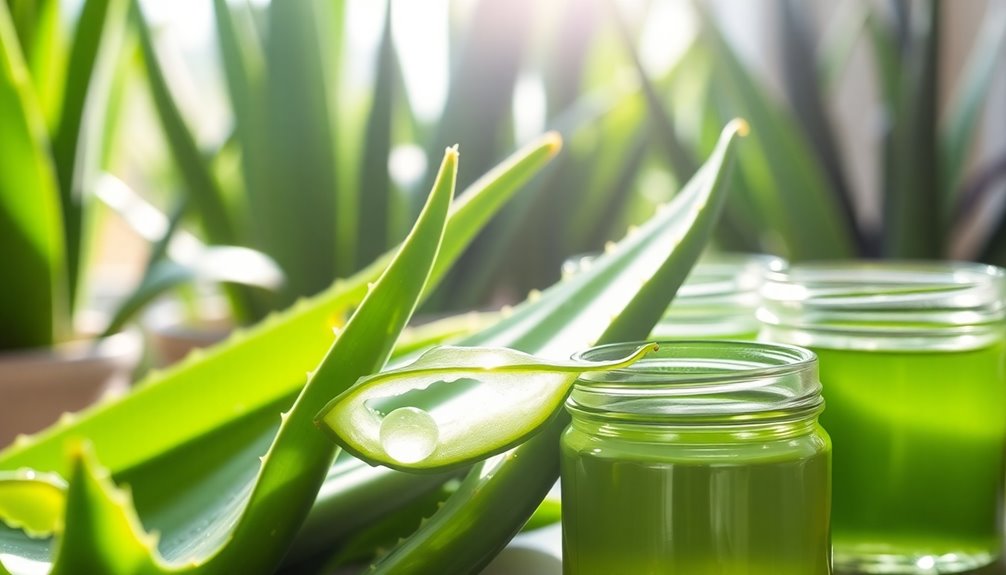
When you incorporate aloe vera into your routine, you'll notice its incredible ability to hydrate and retain moisture in your skin.
It also plays a key role in treating and preventing acne, thanks to its antimicrobial properties.
Plus, using aloe vera can promote scalp health and encourage hair growth, making it a powerhouse for both skin and hair care.
Hydration and Moisture Retention
While you're seeking natural solutions for hydration, raw aloe vera stands out as an exceptional choice for both skin and hair care. Its gel, packed with 99% water, delivers remarkable moisture retention and enhances hydration.
Here are four key benefits you'll love:
- Polysaccharides form a protective barrier on your skin, preventing dryness.
- Regular use boosts collagen production, improving skin elasticity and texture.
- As a natural conditioner, it reduces breakage and adds shine to your hair.
- Its antimicrobial properties create a healthy scalp environment, essential for moisture retention.
Incorporating aloe vera into your routine can transform your skin and hair, ensuring they stay hydrated and vibrant. Additionally, its ability to support skin elasticity makes it a valuable addition to any beauty regimen.
Give it a try, and experience the difference!
Acne Treatment and Prevention
Acne can be a frustrating skin condition, but incorporating raw aloe vera into your skincare routine offers a natural way to combat it effectively. Aloe vera's antibacterial properties help reduce acne-causing bacteria, while its topical application soothes redness and inflammation, promoting clearer skin over time. Additionally, knowing the importance of knowing specific gym hours can help you schedule workouts that complement your skincare regimen.
Here's a quick overview of the benefits:
| Benefits | Description |
|---|---|
| Acne Treatment | Reduces acne-causing bacteria |
| Soothes Redness | Eases inflammation and irritation |
| Improves Skin Elasticity | Enhances overall skin texture and reduces scars |
| Moisturizing Properties | Prevents dryness, ensuring adequate hydration |
Incorporating aloe vera juice into your diet supports hydration and nutrient absorption, further enhancing your skin's health and preventing future flare-ups.
Scalp Health and Growth
Beyond its benefits for acne, raw aloe vera also plays a significant role in promoting scalp health and hair growth. By incorporating aloe vera into your routine, you can enjoy these benefits:
- Exfoliation: Its enzymes remove dead skin cells, reducing dandruff and creating a healthier environment for hair growth.
- Hydration: The plant's moisturizing properties keep your scalp hydrated, preventing dryness and flakiness.
- Protection: Rich in antioxidants and antimicrobial compounds, aloe vera safeguards against infections and supports healthy hair follicles.
- Strengthening: Regular use enhances hair strength and reduces breakage, leading to thicker, healthier-looking hair.
Moreover, using aloe vera in conjunction with essential oils for hair growth can further stimulate hair follicles and promote a thriving scalp environment.
If you're dealing with scalp issues like seborrheic dermatitis, aloe vera could promote hair growth and restore your confidence!
Antioxidant Properties and Overall Wellness

As you explore ways to enhance your overall wellness, consider the remarkable antioxidant properties of aloe vera. This succulent is packed with powerful polyphenols, which help combat oxidative stress and may lower your risk of chronic diseases like heart disease and cancer.
By boosting your body's antioxidant defense system, aloe vera enhances your plasma antioxidant capacity, promoting better health. Chronic oxidative stress is linked to various health conditions, including diabetes and inflammation, making aloe vera's ability to reduce inflammation essential for your well-being.
Incorporating aloe vera juice into your diet offers a low-calorie source of these important antioxidants, with only eight calories per eight-ounce serving, supporting a healthy lifestyle packed with beneficial bioactive compounds. Additionally, chia seeds' high antioxidant content may further complement your wellness routine.
How to Incorporate Raw Aloe Vera Into Your Diet
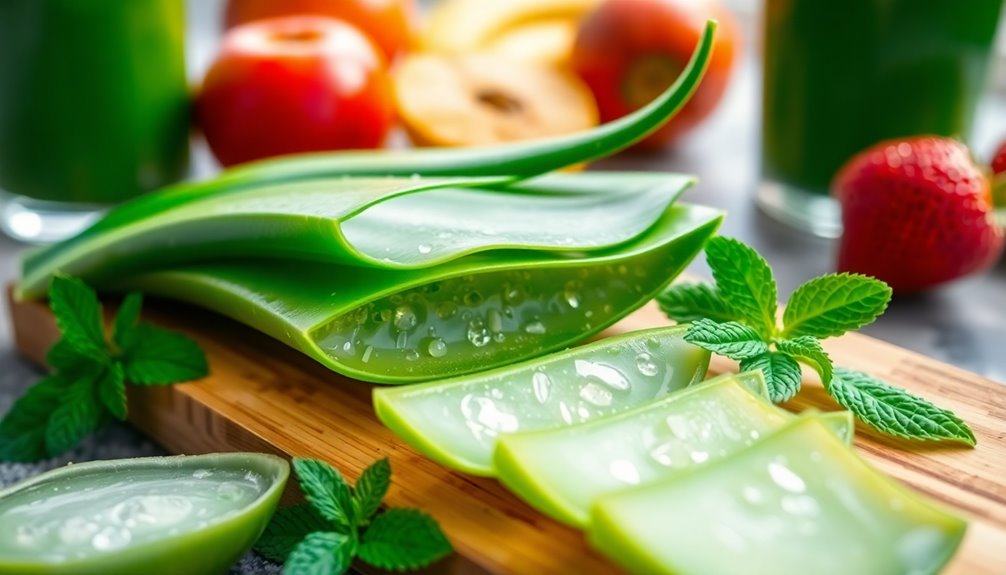
If you're looking to boost your health with raw aloe vera, incorporating it into your diet can be both simple and delicious. Here are some easy ways to enjoy its health benefits:
- Smoothies: Blend raw aloe vera gel with fruits like pineapple or mango for a tasty juice that masks its bitterness.
- Salads: Add 1-2 tablespoons of the gel as a crunchy topping or mix it into salad dressings for extra nutrients.
- Energy Shots: Combine raw aloe vera with lemon juice, ginger, and honey for a revitalizing, health-promoting drink.
- Monitor Intake: Aim for a daily maximum of one cup to maximize health benefits while keeping an eye on your body's response.
Precautions and Considerations When Eating Aloe Vera
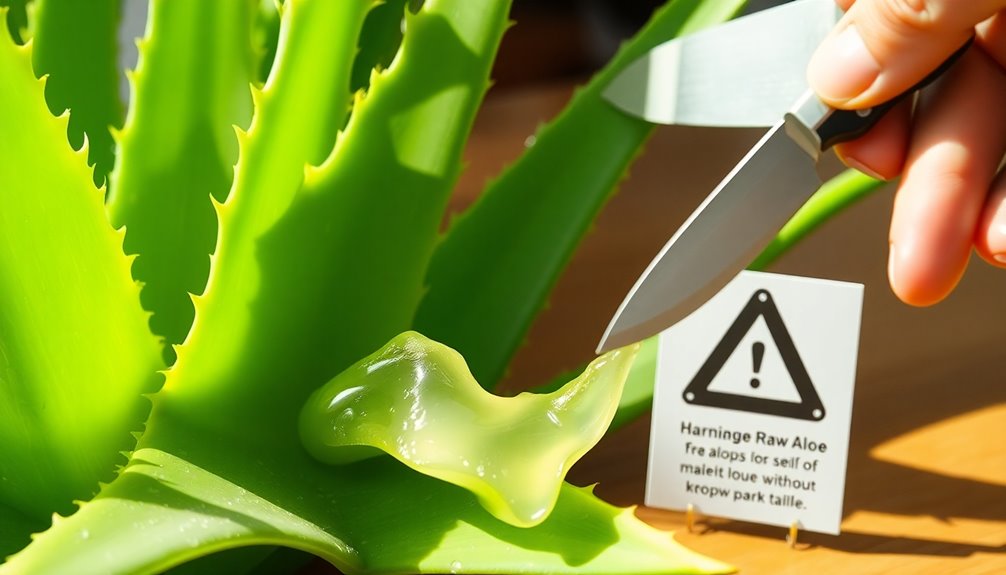
Before you add aloe vera to your diet, it's essential to take into account potential allergic reactions and stick to moderate consumption.
Always consult a healthcare professional, especially if you're pregnant, breastfeeding, or on medication.
Starting slow can help you assess how your body responds to this plant.
Potential Allergic Reactions
While many people enjoy the health benefits of raw aloe vera, it’s important to be aware of potential allergic reactions. Here are some important considerations: Before incorporating raw aloe vera into your diet or skincare routine, consider conducting a patch test to check for any adverse reactions. Some individuals may experience skin irritation or gastrointestinal discomfort after consumption. By being cautious, you can unlock the full potential of aloe vera health benefits revealed while minimizing your risk of allergies. Always consult with a healthcare professional if you’re unsure about using aloe vera, especially if you have existing allergies or health conditions.
- Skin Irritation: Some individuals may experience rashes or irritation after contact.
- Gastrointestinal Distress: Consuming excessive amounts can lead to cramping or diarrhea.
- Electrolyte Imbalance: Aloe latex contains compounds that may disrupt your electrolyte levels.
- Consulting a Healthcare Professional: Always talk to a healthcare professional if you have pre-existing health conditions or allergies, especially to plants in the lily family.
To minimize health risks, avoid consuming raw aloe vera during pregnancy or breastfeeding without proper guidance. Additionally, it is important to be aware of infection risks associated with consuming raw plants, as improper handling can lead to exposure to harmful bacteria.
Being informed can help you enjoy aloe vera safely!
Moderate Consumption Recommended
Moderate consumption of raw aloe vera is vital for reaping its benefits without facing adverse effects. It's recommended to limit your intake to one cup per day to prevent gastrointestinal issues like cramping or diarrhea.
Start with smaller amounts to gauge your tolerance before increasing your intake. The FDA has withdrawn approval for aloe vera latex due to safety concerns, so always opt for purified aloe products.
High doses can lead to serious side effects, including electrolyte imbalances and kidney damage. As a result, it's important to seek medical advice before consuming aloe vera, especially if you're pregnant, breastfeeding, or have children under 12.
Prioritizing moderation will help you enjoy the health benefits while minimizing risks.
Consult Healthcare Professionals
Consulting healthcare professionals is essential when evaluating the inclusion of raw aloe vera in your diet, especially given its potential risks. It's vital to get medical advice before diving in.
Here are some key points to take into account:
- Individuals with health conditions like diabetes should consult healthcare professionals, as aloe vera may interact with medications.
- Pregnant and breastfeeding women are advised to avoid raw aloe vera due to potential risks to fetal or infant health.
- Children under 12 shouldn't consume raw aloe vera without medical supervision, as the safety of aloe latex for this age group is unclear.
- Be aware that the FDA hasn't approved aloe vera latex for over-the-counter sales, emphasizing the importance of professional guidance for safety.
Frequently Asked Questions
Is Eating Raw Aloe Good for You?
Eating raw aloe can be good for you, but it's important to be cautious. The gel is packed with antioxidants and may help with digestion and inflammation.
However, the latex in raw aloe can be toxic and lead to unpleasant side effects like cramping. If you decide to try it, start with small amounts to see how your body reacts, and stick to about one cup of aloe juice per day to avoid discomfort.
What Does Aloe Vera Do to a Woman's Body?
Aloe vera offers multiple benefits for your body. It can enhance your skin's elasticity and reduce wrinkles, especially if you're over 40.
The plant's anti-inflammatory properties might help soothe skin issues like acne, reducing redness and promoting healing.
Drinking aloe vera juice may improve your digestive health and aid in managing blood sugar levels, enhancing insulin sensitivity.
Additionally, its antibacterial properties can support your oral health by reducing plaque and gingivitis.
What Does Drinking Raw Aloe Vera Do?
Ever wondered how drinking raw aloe vera can impact your body?
When you consume it, you might notice improved digestion and relief from constipation due to its laxative effects.
It's also packed with antioxidants, which can help lower oxidative stress and reduce the risk of chronic diseases.
Plus, it may even aid in managing blood sugar levels.
Just remember to choose purified aloe vera juice to avoid harmful compounds.
Enjoy the benefits!
Does Aloe Vera Clean Out Your System?
Aloe vera can help clean out your system, primarily due to its laxative properties.
When you consume it, it may soften your stool and promote bowel movements, aiding in relieving constipation.
However, you should be cautious with your intake, as too much can lead to cramps or diarrhea.
Always consult a healthcare professional before using aloe vera for detoxification to guarantee it's safe and effective for your specific needs.
Conclusion
Incorporating raw aloe vera into your diet can feel like adding a burst of sunshine to your daily routine. With its vibrant nutritional profile, it's a revitalizing ally for your digestive health, skin, and overall wellness. So, why not embrace this green gem? By savoring its benefits, you're not just nourishing your body; you're inviting a little magic into your life. Immerse yourself in the world of aloe vera, and watch as it transforms your health and vigor!
Cindy thoroughly researches juicing trends, techniques, and recipes to provide readers with practical advice and inspiration. Her writing style is accessible, engaging, and designed to make complex concepts easy to understand. Cindy’s dedication to promoting the advantages of juicing shines through her work, empowering readers to make positive changes in their lives through the simple act of juicing.

